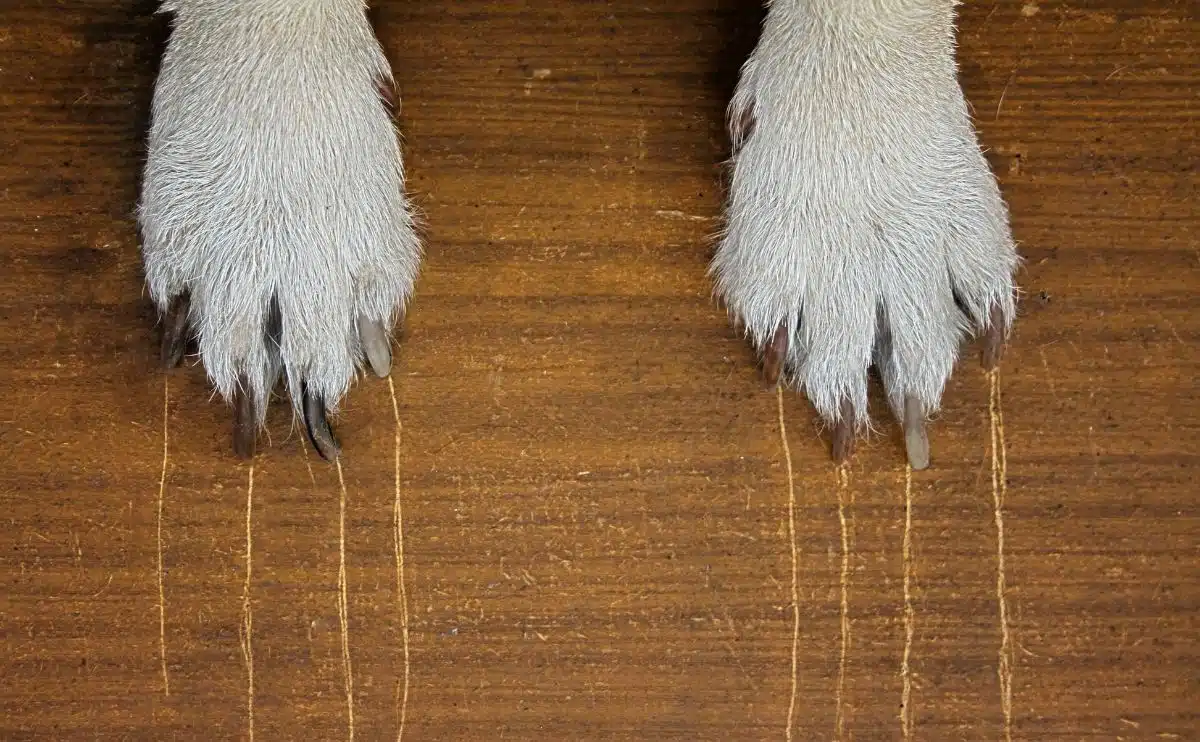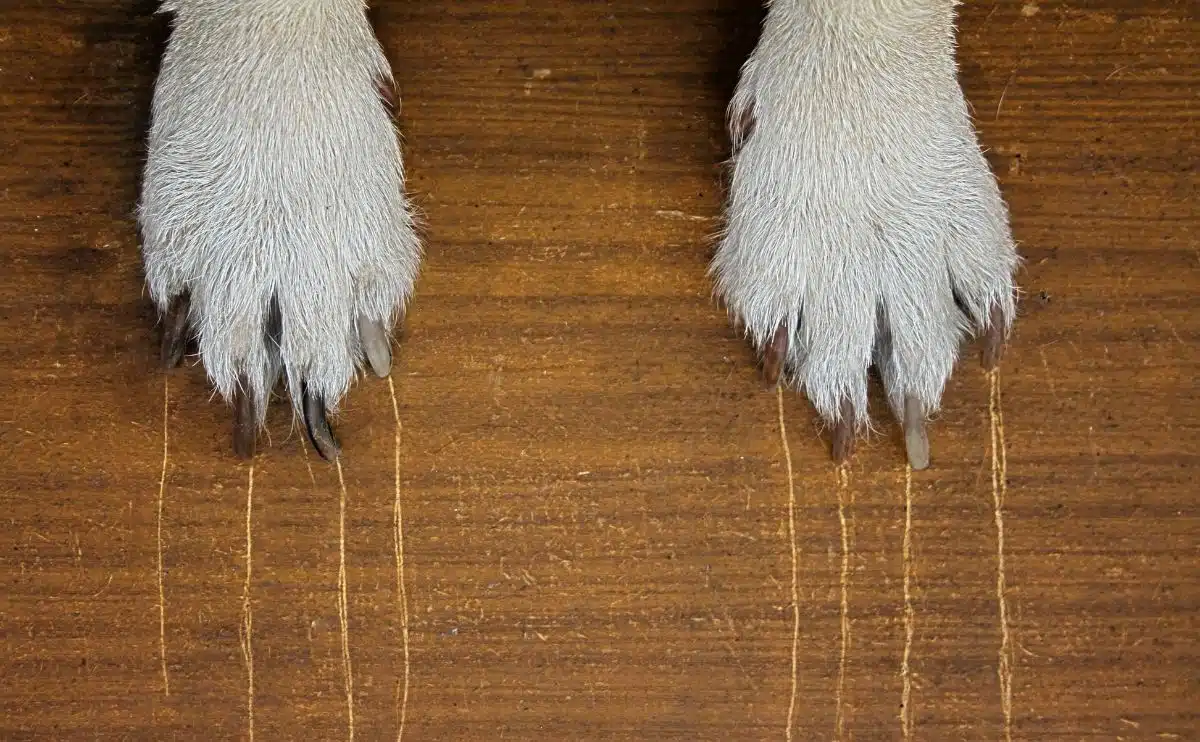
To keep the lights on, we receive affiliate commissions via some of our links. Our review process.

Dogs scratching at the floor is a common behavior. Pet owners often see their pups digging outside, pawing at the ground before and after they use the bathroom, and scratching flooring inside the house. While it is common behavior, owners often have questions about the reasons why dogs scratch at the floor. There are a few different motivations behind this behavior, and owners must understand what might be causing it.
Why Does My Dog Scratch The Floor?
Contents
A dog scratching could mean a few different things. When outside, they commonly dig at areas in the yard they find intriguing or paw around before and after using the bathroom. When they do it inside, it can be due to anxiety, boredom, instinct, health issues, or simply to get comfortable.
Top 3 Reasons Dog Is Scratching The Floor
Let’s get into a little more detail about the top reasons why dogs scratch floors. Owners should always take note of what is going on around their pets at the time this behavior occurs. Anytime a pet starts to scratch obsessively or seems to be causing injury to themselves or damage to the home, owners must take steps to understand the motivation and modify this behavior.
1. Boredom Or Seeking Attention
One of the top reasons dogs may start digging at the flooring, carpet, or ground is that they are bored. As hard as owners try to keep dogs active and interact with them, they often find themselves needing something to do. If they feel tedious, or their mental and physical needs are unmet, they can start digging at floors out of boredom.
Craving interaction or attention from their human companions can be a big motivator to scratch things. Owners will eventually notice this behavior and get involved. In some cases, pets may learn that this behavior gets them a positive response and attention from their owner and may engage in it to reap those rewards.
2. Nail Filing
Dogs whose nails are too long may feel uncomfortable. The back-and-forth motion can help dull and grind down their nails, similar to when we take them for a walk on the concrete. If your dog suddenly scratches the floor, inspecting his paws and nails is a good idea to ensure there’s nothing stuck in there and that he does not need a trim.
Just like keeping their nails manageable, some pups are very particular about the cleanliness of their paws. If anything is stuck between them, poking, or sticky, they may scratch to remove the debris.
3. Anxiety & Stress
A very common reason dogs scratch the ground is anxiety or stress, including separation anxiety. Loud noises, sudden changes to their routine, being left alone, a trip to the vet, or a new pet, all these things can trigger stress and anxiety. Scratching the flooring is a way dogs let out their frustration, but it may also be a way they are trying to signal they want to get out of the situation. Canines suffering from anxiety need to have a calm, consistent environment. Ensure your pup gets high-quality food, fresh water, regular physical exercise, and mental play.
Personal Experience
“Identifying the triggers of your pup’s stress and anxiety is essential. For example, my dog Daisy is about 11 years old. She’s very sensitive to the sound of power tools. She will often paw the floors or door if she hears power tools being used outside. This happens a lot in the springtime when people use their lawnmowers. When I notice her starting to scratch, I immediately check to see if anyone is using power tools or something that sounds similar, as I know this is an anxiety trigger for her. I do my best to reduce the noise and often put on music for her to cover the sounds, which she finds soothing.”
Danielle D. Canine Journal
Other signs of canine anxiety include pacing, shaking, whining, barking, excessive licking, shedding, urge to use the bathroom, panting, breathing heavily, avoidant behavior, or even acting scared. It’s essential to make your dog feel safe and help them relax during these situations. It is best to identify and separate from the stressor. Offer your dog some cuddles, treats, and one-on-one playtime to help reset a normal, unthreatening environment.
Why Do Dogs Dig At The Floor?
Along with scratching, some canines tend to dig at floors or the ground. This is generally fine outside unless it is in your vegetable garden or flower beds. Inside the house, this is much more destructive behavior. Some breeds are prone to it. Additionally, canines are driven by scent, as we explain below.
Instinct
Several canine breeds are more inclined genetically to dig than others. These include the Beagle, Cairn Terrier, Dachshund, Siberian Husky, Alaskan Malamute, Smooth Fox Terrier, Border Collie, Schnauzer, and more. Just about any terrier breed loves to dig. Many of these breeds were originally used as farm hands and ratters and developed incredible digging skills and instincts. Those instincts remain strong today.
Investigating
Canines can dig and scratch the floor because they smell something intriguing. After all, they have incredibly powerful olfactory senses. Sometimes they may be trying to reach whatever that smell is. A bone they buried, an unwanted pest or rodent, hidden food, or unique aromas can draw their attention. Along with investigating smells, pups can dig and scratch the flooring to spread their scent. Canines have scent glands in their paws, so this action helps spread their unique pheromones, leaving their scent behind for other pups to find.
Why Do Dogs Scratch The Floor Before They Lay Down?
Many canine owners will observe their pups scratching the ground or area before lying down. This behavior is motivated both by instinct and comfort. Scratching allows canines to spread their scent, marking territory and letting other animals know that this is their claimed area. This scraping motion also helps pups create the feeling of a nest they can cuddle into and stay warm and comfortable.
Owners often notice dogs scratching at furniture or their beds before settling down. Most likely, this is similar to how humans stretch and fluff pillows and blankets before curling up for the night.
Why Is My Dog Scratching The Floor At Night?
A dog scratching the flooring before bed is generally due to marking territory, spreading scent, and getting comfortable. Sometimes, it can indicate your dog is stressed or anxious about something. Perhaps he has a stomachache or needs to use the restroom.
In some cases, pets may have an underlying skin condition, sickness, injury, soreness, or painful condition that causes discomfort when they try to rest. This can happen with pets with joint pain, hip dysplasia, or other conditions that make it hard to get comfortable and move around. This can even be a sign of cognitive dysfunction that can occur as canines age.
In some cases, pups may wake up in the middle of the night and become disoriented. This can trigger anxiety or uneasiness, and they may scratch the ground or flooring to relieve this feeling.
At night some dogs may start scratching at bedding or carpeting. Dogs who start clawing at the wall or door are likely uncomfortable or stressed out. Perhaps they needed more exercise that day or missed out on playtime. Just like humans, pups with extra energy at night can get restless, and scratching is a way to release some of this. A walk or extra place session in the evening may help alleviate this excess energy if that is the culprit.
How To Stop Dog Scratching At The Floor: 8 Tactics
Most of the time, dogs scratching at floors is a limited behavior and not harmful. If it is due to a typical cause like boredom or excess energy, try working in some new toys, extra walks, or one-on-one interactive playtime. Not all scratch behavior needs to be stopped, especially if it is only mild. It happens your pet communicates something to you, like they want a snack or need to go outside.
There are a few approaches for owners who feel it necessary to stop scratching. Consider the following methods:
- Regularly inspect your pet’s paws for injury or debris.
- Keep their nails trimmed to a manageable, comfortable length. If need be, you can use nail caps or protective booties.
- Ensure your dog gets plenty of exercise and daily walks.
- Provide a wide, rotating variety of interactive toys, games, and treats to keep your pet occupied.
- For pups who scratch at night, try offering a new bed and taking them for a quick walk in the evening to burn off excess energy.
- Keep floors clean and free of debris, crumbs, or food drops that may attract them.
- You can try preserving your floors using finishings, carpets, and rugs.
- Don’t be afraid to seek medical help or guidance when necessary.
Along with these methods, a big step to stopping or discouraging a dog from clawing flooring is to determine the cause. This means scheduling an exam with your vet to rule out any underlying medical causes. These can be as simple as skin irritation, injury, debris, or damage to the paw, or something more involved, like incontinence, arthritic pain, stomach pain, or separation anxiety.
Treating Separation Anxiety
If you find the cause of your pup’s digging and scraping is separation anxiety, it is important to take steps to prevent escape attempts and injury. Dogs who feel fright, anxious, or uncomfortable at home alone often try to get out, which can injure them and damage your home. Separation anxiety can lead to depression, insomnia, restlessness, produced energy, weight loss, and even loss of appetite. Taking steps to get your dog treatment for separation anxiety is essential. There are a few approaches to try, including counter-conditioning, seeking the advice of an animal behaviorist and your veterinarian, and in some cases, medication.
Along with seeking out the help of your veterinarian and a pet behaviorist, ensure your dog has a high-quality, well-balanced diet full of natural ingredients and tasty animal protein. Consider joint supplements if your dog is older and in pain, as well as CBD oil or treats to help manage mood and calm behavior and aid in restful sleep.
Tagged With: Trivia